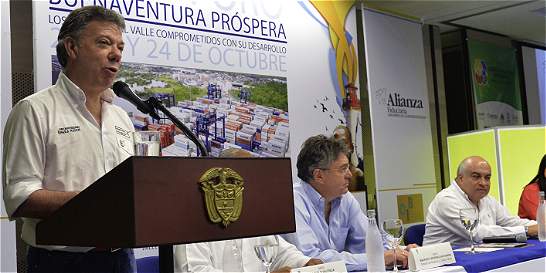Colombia’s president claims that a 90-day urban security surge has reduced crime by 25 percent in its first week, but, even if these statistics are accurate, it is unlikely that the results will be sustained past the end of the initiative.
At an October 25 event in the port city of Buenaventura, President Juan Manuel Santos stated that during the first week of the new security initiative, which targets 11 cities, police disbanded seven drug trafficking groups, four gangs dedicated to cellphone theft, and 17 criminal groups dedicated to robbery, according to the presidency’s website. He said that 2,500 people had been arrested and 216 weapons had been seized.
The 90-day emergency security surge, “Vamos Seguros” or “Let’s be Safe,” is intended to combat extortion, micro-trafficking, illegal mining, robbery, contraband, and homicide. It includes the deployment of 1,000 police officers who formerly held administrative positions to patrol the target cities. Police are also working to dismantle 102 criminal groups identified as the country’s most dangerous.
Meanwhile, in a separate scheme to target contraband, drug trafficking, and arms smuggling, President Santos signed a decree that will allow officials to scan containers leaving or entering Buenaventura.
InSight Crime Analysis
The president did not specify how he had calculated the 25 percent drop in crime, making it hard to assess the validity of his claims. But, even if the security initiative has slashed crime rates, it is highly unlikely that this reduction will be sustained after the surge ends in January.
Without social programs addressing the root causes of urban crime and judicial reforms targeting impunity, temporarily putting more police on the streets will not produce lasting results. It is also unclear how this measure will combat illegal mining — one of the target crimes — which is a phenomenon seen principally in rural areas.
SEE ALSO: Colombia News and Profiles
Urban security is a big concern for Colombia’s electorate — the country’s 2012 Citizen Security Survey (pdf) revealed that 61 percent of respondents felt their city was unsafe. It is therefore crucial for Santos to be seen as acting to boost security in the country’s major urban areas.
Unlike the security surge, the planned purchase of scanners in Buenaventura is a concrete, lasting measure that will likely aid authorities in detecting contraband, weapons, and drug shipments. Buenaventura is a major transshipment point for drugs leaving via maritime routes, and, according to El Pais, the authorities are currently only able to inspect 2 percent of the containers entering and leaving the port.

